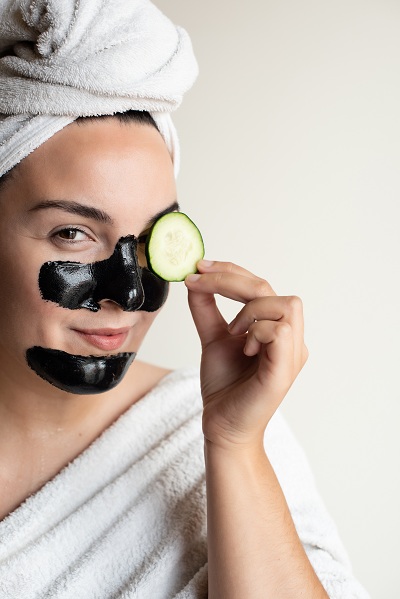You may think that you have the perfect skincare routine, but unless cucumber seed oil happens to be a part of it, your skin is missing out. Beneficial for all skin types, this multi-tasking botanical is brimming with some serious skin-boosting compounds, capable of helping with just about every skin concern and condition out there.
Contents
What is Cucumber Seed Oil?
As you can tell from its name, cucumber seed oil is extracted from cucumber seeds. This clear yellow oil is lightweight, absorbs easily, and doesn’t leave the skin feeling greasy, making it a gamechanger in the skincare industry.
The Skin Benefits of Cucumber Seed Oil
Cucumber oil offers numerous benefits, but let’s take a look at seven of the most impressive:
Fights Free Radicals
Cucumber seed oil contains a selection of different antioxidants, including alpha-tocopherol, a form of vitamin E. Antioxidants are key in fighting free radicals in the skin. These dangerous molecules would otherwise cause some serious destruction to your skin cells, destroying your skin’s protein fibers to speed up the skin aging process.
Boosts Collagen Production
Even if you use plenty of antioxidants, collagen production still naturally declines with age. However, thanks to the phytosterols in cucumbers, this botanical is able to increase the skin’s production of collagen and elastin. The result? Fewer fine lines and wrinkles [1], with skin elasticity noticeably improving. This also makes the ingredient useful when treating stretch marks.
Protects Skin Cells from UV Rays

We’ve already mentioned how the vitamin E in cucumber oil helps to fight free radicals, but it does so much more than this too. Another of its benefits is how it helps to protect the skin from harmful UV rays [2]. With sun damage responsible for everything from wrinkles to dark spots, this goes a long way in keeping the skin looking youthful and healthy.
Contains Fatty Acids to Treat Acne
Cucumber seed oil contains the following fatty acids:
- Linoleic acid
- Oleic acid
- Palmitic acid
- Stearic acid
- Linolenic acid
Each fatty acid has its own unique effects on the skin. When it comes to treating acne, linoleic acid is what you want to see – research shows that those who suffer from breakouts usually have lower levels of this fatty acid in their skin. Boosting your skin’s linoleic acid content helps to reduce breakouts, while also calming any inflammation and redness [3]. And don’t worry, this natural oil is non-comedogenic, meaning that it won’t clog up your pores or leave your skin feeling greasy.
Anti-Inflammatory Properties
As mentioned, cucumber seed oil contains numerous fatty acids that give it powerful anti-inflammatory properties. In addition to helping with acne, this also soothes other inflammatory skin conditions, such as psoriasis, eczema, and rosacea.
Even if you don’t suffer from one of these, reducing inflammation in your skin is still important, especially considering the fact that chronic inflammation is strongly linked to fine lines and skin aging [4].

Hydrates Dry Skin
Once again, the fatty acids, especially palmitic acid, in cucumber oil come into the spotlight, this time for treating dry skin. It’s not often that you’ll find an ingredient capable of treating both oiliness and dryness, which is exactly what makes this botanical and its many fatty acids so impressive. It hydrates and moisturizes the skin, while also stimulating cell regeneration, meaning a plumper, softer, and healthier complexion in the long run.
Fades Dark Spots and Discoloration
Increasing cell regeneration already helps with dark spots to an extent. However, the proteolytic enzymes in this plant oil, along with vitamins B and C, give it a brightening effect too. Whether you’re looking to fade hyperpigmentation, target dark circles around your eyes, or simply want to brighten up a dull skin tone, cucumber seed oil contains several compounds that will help you to do this.
How to Add Cucumber Oil to Your Skin Care Routine
Cucumber oil is used in a variety of skin care products, but a serum would be the most beneficial. The ingredient plays well with just about every other ingredient out there, so you have nothing to worry about when adding a cucumber oil product to your routine.
Purchasing a pure version of the oil is another option. Since cucumber oil is classed as a carrier oil, you’ll be able to mix it with other oils and extracts to create your very own potent skin care blend.
Does Cucumber Oil Have Any Side Effects?
Cucumber oil is gentle and natural, with no known side effects. That said, if your skin is prone to sensitivities, perform a patch test before applying the oil to your face.
FAQs

What does cucumber seed oil smell like?
Cucumber seed oil has a very mild aroma – it’ll remind you of the scent of freshly-sliced cucumbers, or even cucumber-infused water.
Is cucumber seed oil good for your skin?
Yes, cucumber seed oil is good for the skin thanks to its vitamin and fatty acid content.
Is cucumber seed oil good for hair?
Yes, cucumber seed oil is great for hair. It promotes hair growth, reduces hair fall, and helps to hydrate and moisturize the hair.
Is cucumber oil good for oily skin?
Yes, cucumber is one of the best oils for oily skin. It will help to rebalance your skin’s sebum production while reducing breakouts.
Conclusion
From treating digestive problems to controlling blood pressure, cucumber seed oil has played a starring role in traditional remedies for thousands of years, and it’s easy to see why. The humble cucumber is packed with more powerful compounds than people realize, and this carries over into its oil. Whether you’re dealing with aging, acne, dryness, dark spots, or simply want to nourish and brighten your complexion, cucumber seed oil is an ingredient that can help.
References
[1] https://www.sciencedirect.com/science/article/pii/S0378874104000376
[2] https://lpi.oregonstate.edu/mic/health-disease/skin-health/vitamin-E
[3] https://pubmed.ncbi.nlm.nih.gov/2936775/
[4] https://www.ncbi.nlm.nih.gov/pmc/articles/PMC4082166/